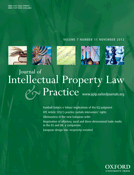
Journal of Intellectual Property Law & Practice
Scope & Guideline
Connecting researchers and practitioners in IP law.
Introduction
Aims and Scopes
- Comprehensive Analysis of Intellectual Property Law:
The journal focuses on a wide spectrum of intellectual property law, including copyright, trademarks, patents, and trade secrets, providing insights into legislation, case law, and emerging legal challenges. - Interdisciplinary Approaches:
It encourages interdisciplinary research that intersects with technology, economics, and cultural studies, exploring how these areas influence and reshape intellectual property laws. - Global Perspectives:
The journal offers a global perspective on IP issues, discussing implications for developed and developing regions, particularly in relation to international treaties and local laws. - Innovation and Technology Impact:
There is a consistent emphasis on the impact of technological advancements, such as artificial intelligence and blockchain, on IP rights and enforcement mechanisms. - Sustainability and Social Justice:
The journal also addresses themes of sustainability, public health, and social justice, particularly in the context of IP rights and their role in promoting equitable access to resources.
Trending and Emerging
- Artificial Intelligence and IP:
A significant increase in discussions surrounding the intersection of artificial intelligence and intellectual property law, particularly regarding authorship, patentability, and copyright implications of AI-generated works. - Geographical Indications and Sustainability:
There is a burgeoning interest in geographical indications, especially in relation to sustainability and local economies, indicating a growing recognition of their importance in promoting agricultural and cultural heritage. - Impact of Digital Transformation:
Emerging themes related to digital transformation, including NFTs and the implications of digital copyright, reflect the journal's focus on how digital platforms are reshaping traditional IP frameworks. - Global Health and IP:
The COVID-19 pandemic has heightened interest in the relationship between intellectual property rights and global health, leading to increased publications addressing IP waivers and access to medicines. - Unfair Competition and New Technologies:
An uptick in papers discussing unfair competition in the context of new technologies, reflecting an evolving understanding of how IP law must adapt to address challenges posed by digital markets.
Declining or Waning
- Traditional IP Enforcement Mechanisms:
There has been a noticeable decline in papers focusing solely on traditional enforcement mechanisms of IP rights, as newer technologies and frameworks are emerging that challenge these conventional approaches. - Regional Focus on Historical Cases:
Papers that delve deeply into historical cases or regional IP issues specific to certain jurisdictions have become less frequent, suggesting a shift towards more contemporary and global issues. - Static Views on IP Rights:
The journal has moved away from static discussions of IP rights, reflecting a broader trend towards dynamic analyses that incorporate current technological and societal changes.
Similar Journals
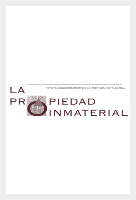
Revista La Propiedad Inmaterial
Empowering Minds, Transforming Ideas in Intellectual PropertyRevista La Propiedad Inmaterial is a distinguished academic journal published by UNIV EXTERNADO COLOMBIA, specializing in the field of intellectual property and its implications across various sectors. Since its inception in 2000, this Open Access journal has provided a platform for researchers, practitioners, and students to disseminate innovative ideas and scholarly work regarding the evolving landscape of intellectual property rights. The journal aims to foster dialogue and research collaboration by featuring peer-reviewed articles, case studies, and reviews that delve into both theoretical and applied aspects of the discipline. Located in Bogotá, Colombia, it plays a pivotal role in the Latin American academic community, addressing regional and global challenges in intellectual property. By prioritizing accessibility, the journal ensures that vital research is available to a diverse audience, encouraging ongoing education and development within the field.

NTUT Journal of Intellectual Property Law and Management
Bridging the Gap Between Law and Management ExcellenceNTUT Journal of Intellectual Property Law and Management is a prominent academic platform published by NATIONAL TAIPEI UNIVERSITY OF TECHNOLOGY, focusing on the critical intersection of intellectual property law, business strategy, and management practices. Established in 2012, this journal disseminates research aimed at enhancing the understanding and management of intellectual property rights, particularly within the dynamic landscape of Taiwan and beyond. Although it is classified within the Q4 quartile across diverse categories such as Business and International Management and Law, this journal remains an essential resource for those seeking insights into contemporary issues and developments within the field. Researchers and practitioners alike will find value in its contributions, which are crucial for navigating the complexities of intellectual property in today’s global economy. While currently not offered as open access, the journal aims to foster scholarly discussion that can drive innovation and protect intellectual creativity. With its continuing commitment to academic rigor and relevance, the NTUT Journal stands as a vital resource for anyone engaged in intellectual property law or management.

Utrecht Journal of International and European Law
Pioneering Research for a Global CommunityUtrecht Journal of International and European Law, published by UBIQUITY PRESS LTD, serves as a dynamic platform for the dissemination of scholarly research in the realms of international and European law. Since its inception as an open-access journal in 2013, it has provided unrestricted access to cutting-edge legal scholarship, fostering global dialogue among legal professionals, researchers, and students. With a notable Scopus rank of 249 out of 1,025 in the law category and a commendable Q3 rating, the journal emphasizes innovative legal theories and practices relevant to contemporary global challenges. Located in the heart of the United Kingdom, the Utrecht Journal is committed to maintaining high academic standards while also promoting the exchange of knowledge across borders, which is crucial given the ever-evolving landscape of international law. As it converges its focus from 2020 to 2024, the journal seeks to become an essential reference for those dedicated to the exploration and expansion of legal discourse in this vital field.

BOSTON UNIVERSITY LAW REVIEW
Illuminating the complexities of law and justice.BOSTON UNIVERSITY LAW REVIEW, a premier legal journal based in the United States, is widely recognized for its contributions to the field of law. Since its inception in 1973, this esteemed publication, with ISSN 0006-8047, has provided a platform for rigorous scholarship and innovative discourse in legal theory and practice. Published by BOSTON UNIV LAW REVIEW, the journal is categorized in the top-tier Q1 of law journals as of 2023, reflecting its high impact and relevance in legal scholarship, backed by a solid Scopus ranking of #219 out of 1025 in Social Sciences _ Law, placing it in the 78th percentile. While not an open-access journal, it remains a vital resource for legal researchers, practitioners, and students, offering comprehensive analyses and insights that inform contemporary legal practices. With a commitment to advancing legal understanding, the BOSTON UNIVERSITY LAW REVIEW seeks to engage and inspire critical thought among its readership.

Studia Prawnicze KUL
Navigating the Complexities of Law TogetherStudia Prawnicze KUL is an esteemed academic journal published by the John Paul II Catholic University of Lublin, dedicated to the exploration of legal studies and philosophy of law. With the ISSN 1897-7146 and E-ISSN 2719-4264, this journal has adopted an Open Access model since 2019, ensuring that its noteworthy contributions to the field are freely accessible to scholars, practitioners, and students worldwide. The journal aims to disseminate rigorous research, theoretical insights, and practical perspectives in law, fostering scholarly dialogue and collaboration among its diverse readership. As a significant platform for legal scholarship in Poland, Studia Prawnicze KUL provides a vital resource for anyone engaged in the complexities of legal theory and practice, making an important impact in the field of legal studies.
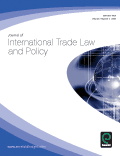
Journal of International Trade Law and Policy
Unveiling Insights in International Trade DynamicsThe Journal of International Trade Law and Policy, published by Emerald Group Publishing Ltd, serves as a crucial platform for the dissemination of research in the fields of international trade law, economics, and political science. Established in 2002, this journal aims to explore the complexities and evolving landscape of trade laws and policies globally, offering valuable insights for researchers, practitioners, and policymakers alike. With an impact factor reflecting its reputable standing, the journal is ranked in the Q3 and Q4 categories across various domains including Law, Political Science, and Industrial Relations, indicating its relevance and contribution to academic discourse. The journal remains committed to advancing knowledge while embracing rigorous peer review processes. Although open access options are currently not available, the journal’s extensive archive promises to be a rich resource for those invested in international trade dynamics as it embarks on its journey toward 2024.

BIOTECHNOLOGY LAW REPORT
Bridging the Gap Between Science and LawBIOTECHNOLOGY LAW REPORT, published by MARY ANN LIEBERT, INC, serves as a pivotal platform for professionals and researchers engaged in the intersection of biotechnology and law. This esteemed journal, with ISSN 0730-031X and E-ISSN 1557-8704, provides critical insights into legal issues and regulatory developments surrounding biotechnological innovations. Covering a diverse range of topics from intellectual property rights to environmental law, the journal aims to foster informed dialogue and policy advancements in a rapidly evolving field. Although it currently stands in the Q4 category for both Biotechnology and Management, Monitoring, Policy and Law, the relevance of its content persists alongside its significant contributions from industry experts and academics. Published in the United States, the journal is committed to offering comprehensive coverage of pertinent themes, despite limited open access options. As it converges its publication years towards the future, BIOTECHNOLOGY LAW REPORT remains crucial for those navigating the complexities of biotechnology legislation and its global implications.
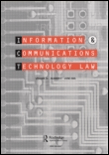
Information & Communications Technology Law
Unraveling the Complexities of ICT Legal FrameworksInformation & Communications Technology Law, an esteemed journal published by Routledge Journals, Taylor & Francis Ltd, serves as a vital platform for the dissemination of critical research and analysis in the intersecting fields of law, communication, and computer science. Established in 1992, this journal has continuously evolved to address the dynamic landscape of information technology and its legal implications, maintaining a significant H-Index that reflects its scholarly impact. With a notable impact factor that places it in the second quartile for communication and law disciplines, and in the third quartile for computer science applications as of 2023, it ranks impressively within the Scopus Metrics—highlighting its relevance and reach among global academia. Covering vital topics from data privacy to intellectual property rights in the digital age, the journal appeals to researchers, practitioners, and students alike by offering insightful articles that explore contemporary issues and emerging trends within ICT law. Although it does not currently offer open access options, its comprehensive articles and reviews are indispensable for anyone seeking to understand the complexities of technology regulation and legal frameworks.

IOWA LAW REVIEW
Pioneering insights into the evolving landscape of law.IOWA LAW REVIEW is a prestigious legal journal published by the University of Iowa College of Law, dedicated to advancing the discourse in the field of law. Since its inception, this journal has become a vital resource for legal scholars, practitioners, and students, committed to publishing rigorous and thought-provoking articles that address contemporary legal challenges. With a strong emphasis on contributions from a diverse range of legal fields, including constitutional law, criminal justice, and property law, the IOWA LAW REVIEW maintains a Q1 ranking in law, reflecting its significance and influence on legal scholarship globally. While the journal is not currently open access, it provides critical insights and perspectives that are essential for understanding the evolving landscape of law. Additionally, with its ranking of #314 out of 1025 in the Scopus database, the journal demonstrates a high impact within the legal community. Scholars and practitioners alike are encouraged to engage with its scholarly articles, as they not only highlight key legal issues but also propose innovative solutions to complex societal problems.
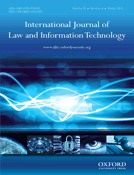
International Journal of Law and Information Technology
Connecting Legal Scholarship with Technological Innovation.The International Journal of Law and Information Technology, published by Oxford University Press, stands as a leading forum for the exploration of the evolving intersection between law and information technology. With its ISSN 0967-0769 and E-ISSN 1464-3693, this esteemed journal has been at the forefront of academic discourse since its inception in 1993 and is poised to continue influencing the landscape of legal scholarship and information sciences until at least 2024. With a prestigious categorization in the Q2 quartile for both Law and Library and Information Sciences, the journal is prominently ranked in the 76th and 64th percentiles respectively within Scopus rankings. Offering insights on vital themes such as privacy, intellectual property, and technological regulation, the International Journal of Law and Information Technology provides a valuable resource for researchers, practitioners, and students alike, facilitating a deeper understanding of the legal challenges and opportunities presented by technological advancements. While not an open-access publication, the rigorous peer-reviewed articles serve to enrich the global academic community’s knowledge in this critical and dynamic field.